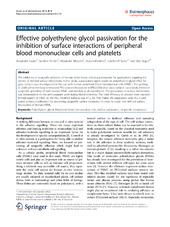Effective polyethylene glycol passivation for the inhibition of surface interactions of peripheral blood mononuclear cells and platelets
Sauter, Alexander; Richter, Gunther; Micoulet, Alexandre; Martinez, Aurora; Spatz, Joachim P.; Appel, Silke
Peer reviewed, Journal article
Published version

Permanent lenke
https://hdl.handle.net/1956/8057Utgivelsesdato
2013-06-20Metadata
Vis full innførselSamlinger
Originalversjon
https://doi.org/10.1186/1559-4106-8-14Sammendrag
The inhibition of unspecific adhesion of human white blood cells is a prerequisite for applications requiring the control of defined surface interactions. In this study, a passivation agent based on polyethylene glycol (PEG) for glass surfaces was investigated for the use with human peripheral blood mononuclear cells (PBMC). The grafting of 2000 g/mol methoxy-terminated PEG-urea-triethoxysilane (mPEG2000) onto glass surfaces successfully inhibited unspecific spreading of both human PBMC and platelets in all experiments. The prevention of surface interactions was independent on the anticoagulant used during blood collection. The total efficiency to prevent even transient immobilization of PBMC to the PEG modified surfaces was 97 ± 2%. This makes the passivation with PEG a well suited surface modification for preventing unspecific surface interaction in order to study only defined surface interactions of human PBMC.
Utgiver
SpringerTidsskrift
BiointerphasesOpphavsrett
Copyright 2013 Sauter et al.; licensee SpringerAlexander Sauter et al.; licensee BioMed Central Ltd.
